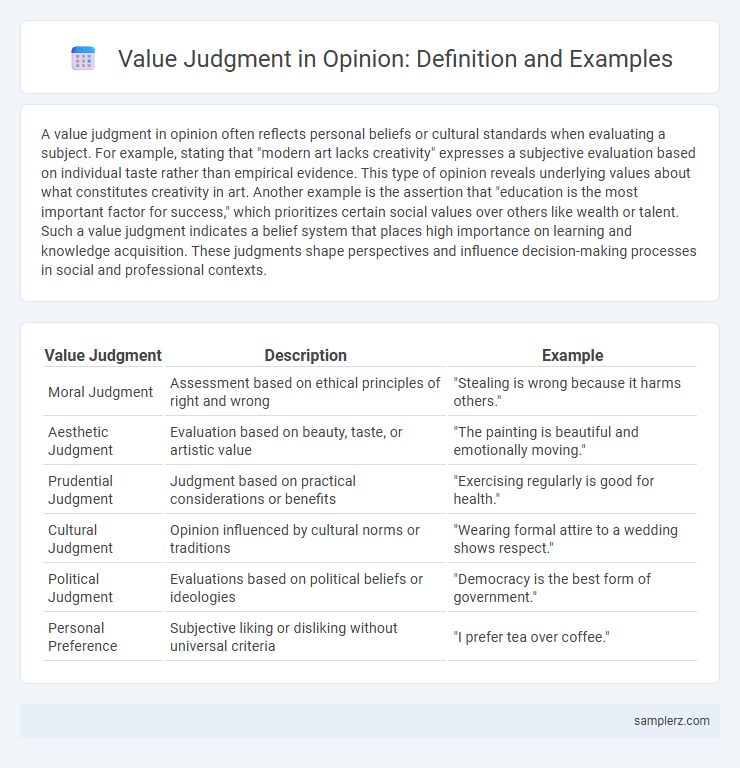A value judgment in opinion often reflects personal beliefs or cultural standards when evaluating a subject. For example, stating that "modern art lacks creativity" expresses a subjective evaluation based on individual taste rather than empirical evidence. This type of opinion reveals underlying values about what constitutes creativity in art. Another example is the assertion that "education is the most important factor for success," which prioritizes certain social values over others like wealth or talent. Such a value judgment indicates a belief system that places high importance on learning and knowledge acquisition. These judgments shape perspectives and influence decision-making processes in social and professional contexts.
Table of Comparison
| Value Judgment | Description | Example |
|---|---|---|
| Moral Judgment | Assessment based on ethical principles of right and wrong | "Stealing is wrong because it harms others." |
| Aesthetic Judgment | Evaluation based on beauty, taste, or artistic value | "The painting is beautiful and emotionally moving." |
| Prudential Judgment | Judgment based on practical considerations or benefits | "Exercising regularly is good for health." |
| Cultural Judgment | Opinion influenced by cultural norms or traditions | "Wearing formal attire to a wedding shows respect." |
| Political Judgment | Evaluations based on political beliefs or ideologies | "Democracy is the best form of government." |
| Personal Preference | Subjective liking or disliking without universal criteria | "I prefer tea over coffee." |
What Is a Value Judgment?
A value judgment is an assessment that reflects personal beliefs, preferences, or ethical standards rather than objective facts. It often involves evaluating something as good or bad, right or wrong, based on subjective criteria. Understanding value judgments is essential for analyzing opinions because they reveal the underlying values influencing an individual's perspective.
Why Value Judgments Matter in Opinions
Value judgments shape opinions by reflecting individual or societal beliefs about what is important or desirable, influencing decision-making and behavior. They help prioritize competing interests and guide moral or ethical considerations in evaluating situations or policies. Recognizing these judgments enhances critical thinking and enables more transparent, balanced discussions.
Common Examples of Value Judgments in Everyday Opinions
Common examples of value judgments in everyday opinions include assessments of honesty, fairness, and kindness, often shaping how people perceive others' actions or character. Statements like "She is a trustworthy friend" or "That policy is unfair" reflect personal standards rooted in cultural and moral beliefs. These value judgments influence social interactions by expressing approval or disapproval based on underlying ethical criteria.
Value Judgment vs. Fact: Drawing the Line
Value judgment involves subjective evaluations, reflecting personal beliefs or cultural norms, whereas facts represent objective, verifiable information independent of individual opinions. Drawing the line between value judgment and fact is crucial in opinion writing to maintain credibility and clarity, ensuring readers distinguish personal views from empirical evidence. Misrepresenting value judgments as facts can lead to misleading conclusions and undermine the integrity of the argument.
The Role of Personal Beliefs in Value Judgments
Personal beliefs serve as the foundation for value judgments, shaping how individuals assess situations, people, or ideas based on subjective criteria rather than objective facts. These beliefs influence the prioritization of moral principles, cultural norms, and personal experiences that guide evaluative opinions. Understanding the role of personal beliefs reveals the inherent subjectivity and variability in value judgments across different perspectives.
How Value Judgments Shape Public Opinion
Value judgments play a crucial role in shaping public opinion by framing issues through personal and cultural beliefs, influencing how people interpret facts and events. These subjective assessments determine priorities and emotional reactions, often driving collective attitudes toward social policies, political candidates, and moral debates. Understanding value judgments helps explain why public opinion varies across different demographics and communities despite access to the same information.
Value Judgments in Social Media Commentary
Value judgments in social media commentary often reflect subjective assessments of online behavior, such as labeling certain posts as respectful or offensive based on cultural norms. These judgments influence public perception by assigning moral or ethical values to content, shaping community standards and driving engagement through approval or criticism. The rapid dissemination of such opinions accelerates social feedback loops, reinforcing dominant narratives or challenging prevailing attitudes within digital communities.
The Impact of Value Judgments on Debates
Value judgments shape the framing and direction of debates by infusing subjective criteria into arguments, influencing what participants consider important or worthy of discussion. These judgments determine the prioritization of ethical principles, cultural norms, and individual beliefs, often leading to polarized viewpoints that reflect deeper societal values. Recognizing the presence of value judgments helps in understanding biases and fosters more nuanced and empathetic dialogues during contentious debates.
Recognizing Value Judgments in News and Editorials
Recognizing value judgments in news and editorials involves identifying subjective opinions embedded within factual reporting, often revealed through evaluative language or selective emphasis on certain details. Value judgments reflect the author's personal beliefs or cultural norms, influencing how information is presented and interpreted by readers. Understanding these judgments is crucial for critical media literacy, enabling audiences to differentiate between objective facts and opinion-based assertions.
Navigating Value Judgments in Personal Relationships
Navigating value judgments in personal relationships involves balancing individual beliefs with mutual respect and empathy. Recognizing that value judgments are influenced by cultural, social, and emotional factors allows for more constructive communication and conflict resolution. Prioritizing openness and active listening can strengthen trust and understanding, fostering healthier and more supportive connections.

example of value judgment in opinion Infographic
 samplerz.com
samplerz.com